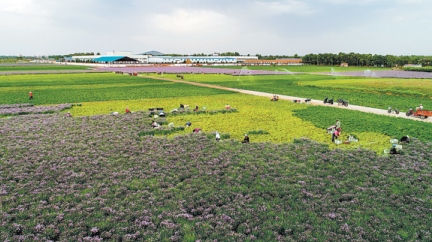Potato crops get to the root of tackling poverty
Updated: 2021-06-18

Farmers harvest scallions on a plantation in the village of Liujiayao in Youyu county. [Photo by Xin Tai for China Daily]
Youyu is among the driest counties in Shanxi province. Finding the right crop for the conditions to ensure food supply and offer a stable channel to increase farmers' revenue has been a decades long challenge for county authorities.
Hao Fan, a local entrepreneur, didn't expect a decision he made 10 years ago would help solve this problem.
A native of Youyu, Hao had been an executive of a power company in the Inner Mongolia autonomous region and had no experience in farming. But after seeing people in his home village struggle to make a living from farming on dry, infertile land, he vowed that one day he would help.
When he learned that potatoes are a crop that can adapt to dry conditions and deliver high yields, he decided to open a farm in 2011.
He quit his job and returned to his home village of Yechang, starting a plantation to grow potatoes on nearly 50 hectares of land.
A yield of 150 metric tons, which brought him a revenue of 1.3 million yuan ($203,000) in the following year, showed that he made the right decision. He then expanded his plantation to about 500 hectares. He later established a company for the planting, seedling cultivation and processing, and sales of potato products.
Encouraged by the success of Hao's business, farmers in neighboring townships have engaged in potato plantations over recent years.
Despite his success, Hao kept looking for other crops to suit local conditions and that could generate greater profits.
He developed forage-grass farms in the rest of Shuozhou city with a total area surpassing 1,000 hectares in 2018. The county of Youyu is a part of Shuozhou.
Hao said by selling forage grass to dairy farms in Inner Mongolia, his plantations generated more than 10 million yuan in revenue last year.
Hao's enterprise has collaborated with local farmers by renting their land, purchasing their produce or providing them with jobs.
Li Baomin, a resident in the village of Yechang, said his family has seen increased incomes over recent years thanks to enterprises like the one owned by Hao.
"We are paid rent from our leased land," Li said. "Some family members now work for Hao's companies and other enterprises in Youyu, with pay much higher than operating our own farm."
In Shuozhou, local authorities are trying to find other resources to help with poverty reduction and rural revitalization.
In Pinglu district, for instance, the local government is leveraging the long daylight hours to develop the solar power industry.
Jia Baoming used to be a member of an impoverished family in Xiaobaiyangwa village. To help to lift the family out of poverty, the village built a small solar farm on his land, giving him an additional revenue from power generation.
There are 29 solar power stations in Shuozhou for the purpose of poverty reduction. More than 7,700 households in 200 villages have benefited from the project, which adds more than 3,000 yuan a year for each family on average, according to the city government.
Li Shu contributed to this story.



